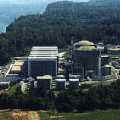|
作者 傑奇•艾倫•朱利安諾 博士
奶奶
還沒講完整個故事
你卻沉默了
現在我回家了
我傾聽四方尋找你的聲音。
-- Jeanetta Calhoun
全美境內103座核能發電廠在往後幾年內,將面臨40年期限的執照換發程序,而許多環保人士認為大部分核能電廠無法通過這個關卡。這是由於建築法規與地震危險規範日趨嚴格,這些電廠有許多在今日根本無法合法建立。
另外,有相當多的證據顯示,許多核能電廠的建築結構中有瑕疵存在;而且,自從1979年三哩島、1986年車諾比事件後,越來越多人反對核能發電。然而,很少人認為我們很可能必須長期生活在輻射威脅之下。
但是布希政府強迫我們面對一個新的事實:不管這些核能電廠是否符合今日的安全標準,大部分都可能通過這次的執照換發。這使得我們更加接近另一次核能災難。
到目前為止,已有南卡羅萊納州和馬里蘭州的兩座核電廠、五個反應爐獲得執照換發,還有更多申請單位正在作業流程當中。

Calvert Cliffs核能電廠,位在華盛頓特區東南方45英哩處,巴爾的摩瓦斯及電力公司(Baltimore
Gas & Electric Company)所有。(照片提供 核能管理委員會Nuclear
Regulatory Commission)
雖然布希政府已發表強烈聲明,支持對核能發電增加投資,並會盡一切努力維持核武工業在未來幾年能夠健全發展;當時柯林頓政府所做的政策改變,實際上已真正使得核電廠的興建更容易、民眾對建新廠更難加以阻止。
柯林頓政府的新規定包括:對特定類型反應爐採取一般性核可標準,以及在核發實際的電廠執照之前就先核准廠址的作業流程。
美國核能管理委員會(NRC)告訴我們,因為執照的最長期限為40年,所以許多核能電廠組件的使用壽命均設計為40年,才能節省成本!這些老舊的設備在執照換發之後,仍被允許繼續運作。
目前全美約有20%電力產自核能發電廠。第一期核發的營運執照將在2006年到期,全國的反應爐執照約有10%將在2010年底前到期,而超過40%將在2015年前到期。
核能電廠所有人有權決定是否申請執照換發。該公司內部則必須符合核能管理委員會的安全規定、並決定執照換發是否符合成本效益的標準。然而在今日電力匱乏的環境中,執照換發肯定會被認定是划算的。
【文章連載】
■生活中已充斥著幅射線-電廠仍然得以換發營運執照
(上) (下)
全文與圖片詳見:http://ens-news.com/ens/jun2001/
2001L-06-01g.html
版權歸屬Environment News Service (ENS),環境資訊協會
(李眉君 譯, 李欣哲、蔡麗伶 審校)
中英對照譯稿請見:http://e-info.org.tw/issue/energy/
2001/sub-energy01082101.htm
|
|
By Jackie Alan Giuliano, Ph.D
grandmother
you were silenced before you could
finish telling me the stories
i am coming home
i am listening everywhere
for your voice.
-- Jeanetta Calhoun
Many environmentalists have assumed that most of the
nation's 103 nuclear power plants would have trouble getting relicensed
when most of their 40-year licenses come up for renewal in the next few
years. With the stricter building codes and earthquake hazard rules,
many of these plants could not be legally built today.
Also, considerable proof exists of the flaws in the
construction of many of these plants and along with the growing popular
opposition to nuclear power since Three Mile Island in 1979 and
Chernobyl in 1986, few thought we would have to live with this threat
much longer.
But the Bush administration has created a new reality
that we all must face: most of these nuclear plants, whether they would
be judged unsafe by today's standards or not, will likely be relicensed,
bringing us all closer to another nuclear disaster.
So far, five reactors on two sites in South Carolina and
Maryland have been relicensed, and more are in the works.

Calvert Cliffs nuclear plant 45
miles southeast of Washington, DC is owned and operated by the Baltimore
Gas & Electric Company. (Photos courtesy Nuclear Regulatory
Commission)
Although the Bush administration has voiced strong
support for increased investments in nuclear power and will do
everything possible to keep the nuclear-military-industrial complex
healthy for many years to come, changes ushered in by the Clinton
administration have actually made it easier to build and much harder for
citizens to stop new nuclear plants.
New Clinton administration rules include generic
approval for particular types of reactors and a process that allows site
approval in advance of an actual plant license.
Because of the 40 year maximum license, the U.S. Nuclear
Regulatory Commission (NRC) tell us that many nuclear plant components
were engineered to 40 year lifetimes to cut costs! This aging equipment
will be allowed to continue to operate when these licenses are renewed.
About 20 percent of all the electric power produced in
the United States comes from nuclear power plants. The first operating
license will expire in the year 2006. About 10 percent of the country's
reactor licenses will expire by the end of the year 2010, and more than
40 percent will expire by the year 2015.
A nuclear power plant owner decides whether or not to
seek renewal of its license. The company then has to satisfy NRC
requirements for safety and criteria that determine whether license
renewal is a cost effective venture. In today's power hungry
environment, license renewal will surely be considered cost effective.
http://ens-news.com/ens/jun2001/
2001L-06-01g.html |
